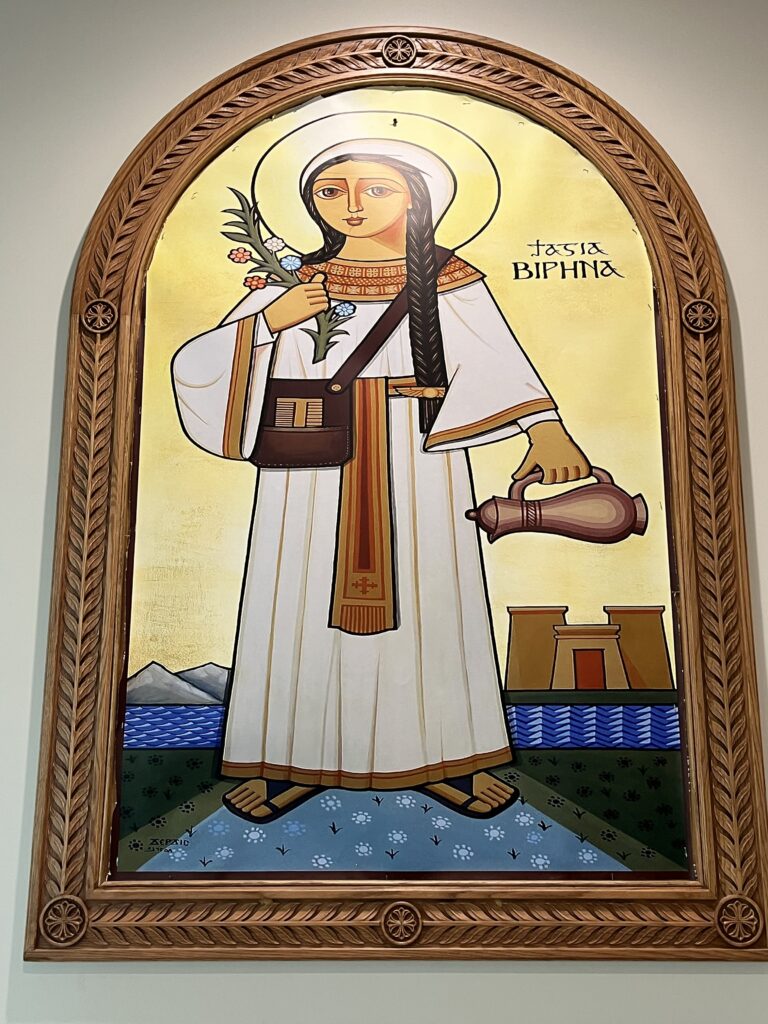
Overview
St. Verena was a noble Christian from Thebes (modern-day Luxor, Egypt) and a relative of St. Maurice. She joined the Theban Legion—an all-Christian Roman legion—on its mission to Switzerland. When the entire legion, including St. Maurice, was martyred for refusing to worship Roman gods or kill innocent Christians, St. Verena remained behind. She lived a life of prayer, fasting, and service. As a trained nurse, she cared for the sick—especially lepers—and guided young girls spiritually and physically. This is why she is shown in the icon with a satchel and water pitcher. St. Verena is also traditionally shown holding a comb to represent her care for the poor and sick. Despite imprisonment and persecution, she remained faithful, led many to Christ, and performed miracles. She departed on the 4th of Thout, and her relics were later returned to Egypt. St. Verena’s life of courage and selfless service calls us to use our gifts to glorify God and help others.
Full Description
St. Verena was a noble Christian woman from Thebes, in modern-day Luxor, Egypt. Raised in a devout family, she was guided in the Christian faith by Bishop Sherimon of Beni Suef, who later baptized her. Verena was also a close relative of St. Maurice, the leader of the Theban Legion—a group of Christian soldiers in the Roman army.
When the Theban Legion was deployed to Gaul (modern-day Switzerland) to serve in the Roman military, Verena accompanied them, as it was customary for family members to travel with soldiers to provide support and care. After St. Maurice and the legion were martyred for refusing to renounce their faith and worship pagan gods, Verena chose not to return home. Instead, she withdrew into a life of asceticism—fasting, prayer, and solitude—in the region of present-day Switzerland, dedicating herself fully to God.
Verena became known for her deep compassion, service to the poor, and healing work. As a nurse, she used her medical training to care for the sick and wounded, especially those suffering from leprosy, treating them tenderly and without fear of infection. At a time when hygiene and sanitation were poorly understood, Verena emphasized cleanliness, teaching people how to care for wounds and maintain basic hygiene—earning her lasting recognition as a promoter of sanitation in early Christian communities.
She also became a spiritual mentor to young women, guiding them in both their physical well-being and spiritual lives. Her growing influence and fame eventually caught the attention of the local pagan authorities. She was arrested and imprisoned for her faith, but was comforted by a vision of St. Maurice, who appeared to strengthen her in her suffering. After her release, she continued her missionary work, traveling across various regions, performing miracles, and leading many to the Christian faith.
At the end of her life, the Holy Virgin Mary appeared to her, offering comfort and strength. St. Verena departed this world on the 4th day of the Coptic month of Thout. Her legacy endured, and in 1986, a delegation from St. Verena Church in Bad Zurzach, Switzerland, returned her holy relics to Egypt.
St. Verena is remembered as a model of selfless service, courage, and faith. Her life exemplifies how personal skills, like nursing, can be used to serve others and glorify God. She continues to inspire the faithful to lead lives of humility, service, and spiritual strength.
Interesting Fact
St. Verena is remembered for her compassion and for promoting hygiene in early Christian communities, teaching wound care and cleanliness when such practices were uncommon.
Citations
St. Verena American Coptic Orthodox Church. “About St. Verena.” Stvnashville.org, https://www.stvnashville.org/st-verena#:~:text=Verena%20came%20from%20a%20noble,general%20of%20the%20Theban%20legion. Accessed 16 May 2025.